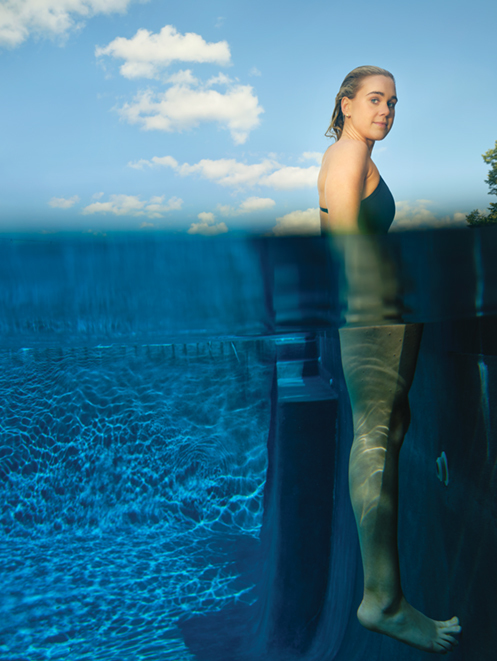
Chris Buck

Chris Buck
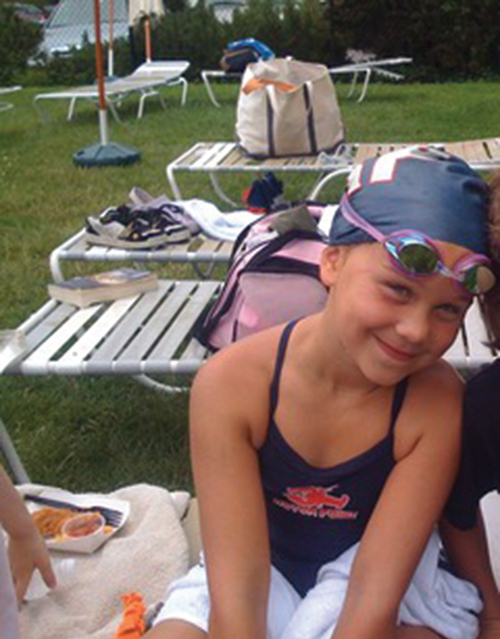
Jody Truwit ’92
A lifelong swimmer, Truwit (shown here at age 7) followed in the footsteps of her mother and uncle to the Yale swim team.
View full image

Jody Truwit ’92
A lifelong swimmer, Truwit (shown here at age 7) followed in the footsteps of her mother and uncle to the Yale swim team.
View full image
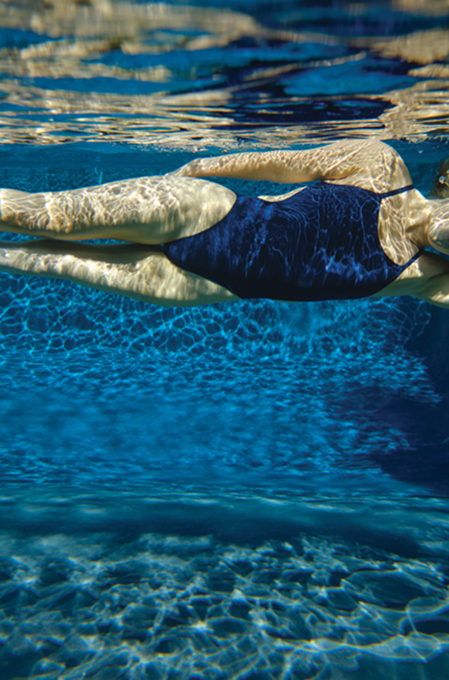
Chris Buck

Chris Buck
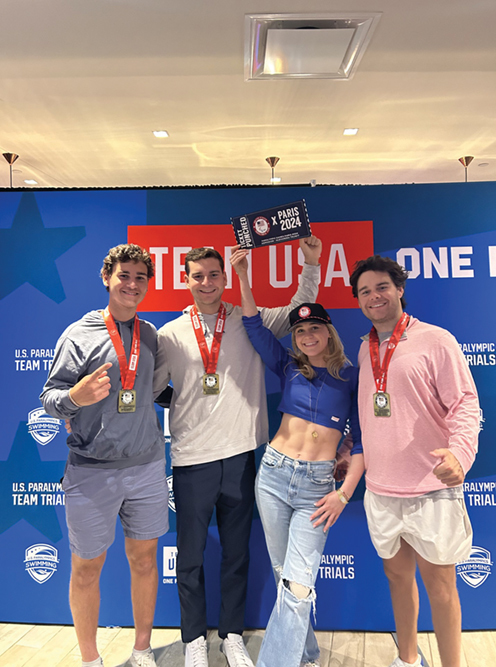
Jody Truwit ’92
Ali with her brothers (left to right), Teddy, Jack,
and Cooper.
View full image

Jody Truwit ’92
Ali with her brothers (left to right), Teddy, Jack,
and Cooper.
View full image
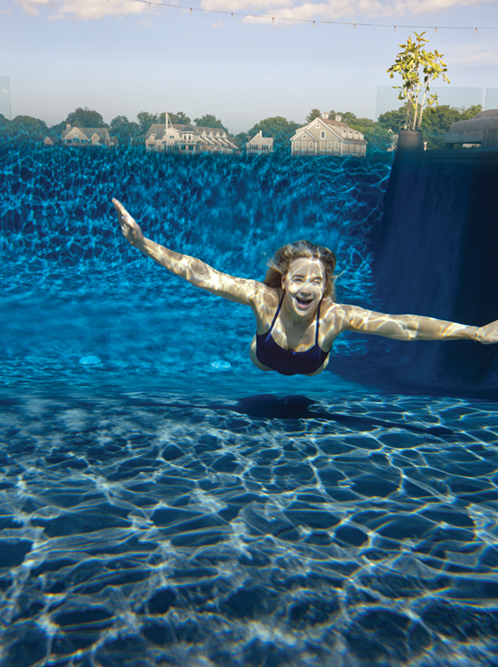
Chris Buck

Chris Buck
Ali Truwit ’23 always loved the water. As a teen in Darien, Connecticut, she played in her family’s backyard pool. She swam on a local team. She was recruited as a swimmer by Yale, where her mother and her uncle had been swimmers before her. Even when a thyroid disorder kept her from swimming competitively in her senior year, she was at the poolside. It was with another Yale swimmer that she made plans to go to Turks and Caicos just after her graduation in 2023. With her family, she had snorkeled in the pale blue water there many times.
Truwit is a planner, someone who doesn’t leave the future to chance, if she can help it. This interlude on the beach was part of a tightly scheduled summer of travel, culminating in starting a job at McKinsey & Company in the fall. Then, if all went well, she would head to Harvard Business School two years later for an MBA. She had turned in her application. She had just run a marathon. Everything was all set.
On May 24, 2023, she and her friend Sophie Pilkinton ’19 were snorkeling off a boat near a beach Truwit knew. As they started to make their way back, a shark appeared. “Sophie saw it before I did. And it came from behind, and then up next to us,” Truwit says. “The next thing I knew, it was underneath us.” The shark rammed them, butted them, pushing against them. “Pretty quickly, it had my leg in its mouth,” she says.
They called for help. No one came. They swam for their lives. Ahead of them was the safety of the boat.
“I remember thinking in my head, am I crazy, or do I not have my foot right now? And I turned around to see,” Truwit says now. “That was really one of the hardest images that stuck with me for a long time, just seeing my footless leg bleeding in the clear blue water.”
When everything falls apart, what do you do? No one can know for sure ahead of time how they will react. Pilkinton and Truwit threw themselves onto the boat, and Pilkinton, who had just finished medical school, wrapped a tourniquet around Truwit’s leg to cut off the blood supply to her wound. The rest of the day and night blended into a nightmare of hospital rooms and pain and, eventually, a medevac flight to a Miami hospital.
Truwit hoped that there would be a way back to that previous reality, the one where she had two feet and ran marathons. Someone found her foot floating in the ocean. It was still wearing a swimming fin.
But it had been too long since the attack to reattach her foot. On her 23rd birthday, eight days after the attack, a portion of her leg was amputated so that she could, some time down the road, wear a prosthetic. This was the new reality. It was hard to say, precisely, what it would contain.
As a swimmer at Yale, Truwit was known for her ebullience and determination, as well as her speed. Jim Henry, Yale’s swim coach, recalls seeing her read a room and figure out what to say after a difficult loss or how to comfort someone going through a hard time. “She has a twinkle in her eye and a smile, and when she gives you that, she’s thinking about what she can do to make it better,” Henry says. “That’s her processing mode of, ‘Let me figure this out. I’ve got this.’”
She made friends swiftly as a student—Pilkinton and diver Hannah Walsh ’19, both several years older, became her close confidants. As well, Henry explains, each incoming swimmer at Yale is assigned to a family of older athletes, one from each year of the last few years. The young swimmer and her “mother,” “grandmother,” “great-grandmother,” and so on often meet up together. “They form bonds quickly, and they spend a lot of time together,” he says. “They not only train together and swim together, but they eat together. They like to take classes together, they study together. They go to movies together. They go to restaurants together. They go on vacation together.”
Walsh remembers, after a 14-hour bus ride to a meet in Columbus, Ohio, goofing off with Truwit and Pilkinton in their hotel, watching movies, scaring each other. Truwit’s father once razzed her on the way to the airport for being so uncouth as to check a bag—now she chuckles at the memory and says she thinks of him whenever she checks a suitcase. During COVID, when Walsh was in New Haven performing research, Truwit moved in with her for a while. “Sophie and I were best friends from day one, and Ali just became a best friend, too,” Walsh says. “We just became really close.”
When the texts began to fly and news about Truwit’s attack spread through the Yale swimming community, support poured in. Truwit’s mother’s teammates took turns sending her flowers every week. Her former Yale teammate Duncan Lee ’20, now working at MIT with a noted prosthetist, got in touch about how to start the journey to using a prosthetic. When Truwit was being moved into her parents’ first-floor guest bedroom to recover, another teammate decorated the place with photographs from Yale swimmers and other friends, to make it feel welcoming and warm.
After Pilkinton, who likely saved Truwit’s life with that tourniquet on the boat deck, Walsh turned out to be the best placed of all the teammates to make a difference right away. The Miami hospital where Truwit was flown happened to be the one where Walsh worked. She was there in the trauma bay when Truwit landed. She was there when Truwit went under for her first surgery. And she was there when Truwit was preparing to be flown north for her last surgery in a hospital in New York, and everything that came after.
Truwit, recovering at her parents’ house in Darien, had a lot of things to think about. It frightened her to think that the joy she had felt in the water might be taken from her. She wanted to get back into the pool in the backyard. She wanted to get strong, as well, as she waited for her wound to heal so she could be fitted for a prosthetic. But it was hard. When she got in, she had flashbacks to the attack. It was physically difficult. “The nerve endings in my leg were reacting to new sensations in the water,” she says. And she struggled with how other people might perceive her. Jamie Barone, the head coach of the swim team at Chelsea Piers in Stamford and Truwit’s coach as a child, says that one day he got a text from her that broke his heart a little.
“It was like, if you think you can stand to look at my leg, I think I’m going to try to swim again, and if you would come back and coach me, that would be great,” he recalls. “I think that she didn’t understand that no one would be repulsed.” He went over to the pool, where she was already in the water. “Alright, let’s get this over with,” he remembers saying. “Let me see it.” She lifted what was left of her leg out of the water. He looked at it, and said, “Alright, great. Now let’s move on. Let’s start swimming.”
Starting in October 2023, Truwit and Barone began to train 90 minutes a day, four days a week. They decided, tentatively, that Truwit might attend a meet in December put on by US Paralympics Swimming, which organizes competitions for swimmers with disabilities. But those first two months were incredibly difficult, Barone recalls. “She was crying almost every day in the water,” he says. “She was terrified of being seen by anybody who she knew.” They talked a lot about that, about new expectations for her speed, about the future. When she first went out in public wearing her prosthetic leg, three Yale teammates were with her for support.
Some days there was more talking than swimming. “A lot of the talking was done while she was in the water. Which is baffling when you think about it, because that is the exact medium she was in when she suffered almost unimaginable trauma,” Barone says. “But I think that’s her safe space, honestly. That’s where she feels at home.” Truwit never missed a practice.
After two months of training, Truwit went to the US Paralympics Swimming Nationals meet. She swam well, and now she had to decide: Did she want to keep going? She had worked things out with McKinsey so she could start her job later than expected. She’d even had her Zoom interview for the Harvard program, five days after her amputation, and been accepted. But if she kept training, she might have a chance of qualifying for the Paris Paralympic games. Get used to your new life, Barone suggested. Take some time to do this. With her employer’s support, Truwit ultimately decided to defer starting work.
Training for a shot at the Paralympics meant going to meets all over, and it meant swimming alongside athletes whose achievements bolstered her confidence. “It was so huge for me to be able to see all of these incredible athletes just conquering obstacles and doing incredible things in the water,” Truwit says. “I think it just gave me so much hope and so much strength for my own journey.” Her parents, Jody ’92 and Mitch Truwit, and her brothers have often been there to cheer her on.
On June 28, Truwit was in Minneapolis to compete for a spot in Paris. She was on her sixth race of the event, the 100 meter freestyle. Right off the blocks, she was behind—not uncommon, says Barone, since she can’t immediately generate the force of an athlete with two feet. When she reached the other side and flipped off the wall, she was in second place by eight tenths of a second, a fairly long lag in competitive swimming. But then something happened, and in videos of the event you can see Truwit suddenly accelerate. “She ended up running this girl down in the last 25 meters,” Barone says. “It was crazy. It’s totally crazy.”
Truwit qualified for the Paris games, just over a year after she was attacked. For her, it’s a vindication that alongside everything she has lost, there are some things she has been able to claw back. It’s also a reminder that sometimes, when the only thing you can control about your situation is how you react, you can find a way through to a new reality, with time, patience, and plenty of ups and downs. The grief is still very real. “There are days that I’m ground down. There are days that this is really hard and it’s too much,” she says. “On those days, I learned to give myself grace.
“As an athlete and just throughout my general life, I was someone who kind of plowed through,” she continues. “Learning that you can take those days, and have the days on the couch, and cry, and then get back up the next day and be grateful for what you do have, and who you do have, and move forward, has been such a huge thing.”
 loading
loading
12 comments
-

Christopher Cole, 9:11am September 05 2024 |  Flag as inappropriate
Flag as inappropriate
-

jiyoun chang, 9:49am September 05 2024 |  Flag as inappropriate
Flag as inappropriate
-

Don Peterson, 9:55am September 05 2024 |  Flag as inappropriate
Flag as inappropriate
-

Sheri Ann Knox, 10:12am September 05 2024 |  Flag as inappropriate
Flag as inappropriate
-

Arthur H. Saxon, 10:24am September 05 2024 |  Flag as inappropriate
Flag as inappropriate
-

Rachel Sperling, 10:58am September 05 2024 |  Flag as inappropriate
Flag as inappropriate
-

Agatha Iskandar, 2:33pm September 05 2024 |  Flag as inappropriate
Flag as inappropriate
-

William Morris Dean, 10:04am September 06 2024 |  Flag as inappropriate
Flag as inappropriate
-

Mark Coan, 9:11am September 07 2024 |  Flag as inappropriate
Flag as inappropriate
-

Saema Somalya, 12:39pm September 07 2024 |  Flag as inappropriate
Flag as inappropriate
-

Marcus de A. Mello , 9:33am September 09 2024 |  Flag as inappropriate
Flag as inappropriate
-

Brian Wynn, 1:17pm October 16 2024 |  Flag as inappropriate
Flag as inappropriate
The comment period has expired.This is really inspiring. Go Ali! You will go far.
I admire your strong life force and passion for swim. Thank you so much for the inspiration.
An amazing story of an amazing person!...definitely inspiring
Life is easy when its easy, but as stated how you react to what life throws you in difficult times speaks volumes.
The water and the ocean is my happy place. I'm glad its still yours, and you continue to thrive in everything you do!
Truly a beautiful ending to a set back. An example of the idiom that one is not defined by their circumstances but rather by their response to those events. Keep your chin up Ali!
Brava, Christi Truwit! You are indeed a true Yalie!
She has the heart of a champion. Go Ali!
You are an inspiration and a true champion, Ali! I wish you all the best at the 2024 Paris Paralympics!! The Yale community is proud and honored to have you as part of Team USA! GO ALI!!
Ali, as an 81-year-old (Yale College Class of 1964), I relate to the final quote of your “Learning that you can take those days, and have the days on the couch, and cry, and then get back up the next day and be grateful for what you do have, and who you do have, and move forward, has been such a huge thing” as a person experiencing the loss that comes from aging. I have days when I (almost) cry, and your heroic example will now inspire me more to get back up the next day with even more gusto and gratitude to move forward. Beginning today. THANK YOU!
If we didn’t suffer and feel losses we would not have the joy of all the good and all the gains we do achieve. You especially have the ability to focus - we each choose what to focus on and to make important, the good dog or the bad dog within, the memories and experiences that propel us upward and forward, or those that deter growth, progress….
Great article. Thanks for reminding us all of Yale at its best and sharing the story of an inspirational woman and community.
Your story is inspiring and will help immensely many who, like myself, struggle to overcome the handicaps life puts on our plate. At age 93 (Yale College '54) I find renewed strength in reading about your experience. I know it will be a great help
to many of us who need to be reminded that partial losses still leave human beings with great untapped resources that allow us to do immense good to LIFE in its many forms.
Noting other responses from the "older end of the spectrum" I too, at 74, see how Ali's bravery and resolve lands with a thud on those of us coping with (facing? attacking?) challenges as we encounter setbacks and left turns involving, knees, hips, organs, losses and life-partners. It sounds trite, but we all have stories (more at our age) about how important attitude (as well as support) can be in these situations.
Ali has now reached out in an unsuspecting, humble way--to inspire. Thanks from so many.
To Ali and all: This is a community. In an "atomic", disconnected world it can be a very important community. Four unique years that cannot be replicated and should never be dismissed. It's roommates, dining halls, swimmers, sailors, singers and performers, writers, professors and more. When you get the invite and think that a reunion is "not my thing", call an old roommate or teammate and check it out before declining. Amidst many other callings, family matters and pursuits, do not lose touch--in bad times, or good--with this community.